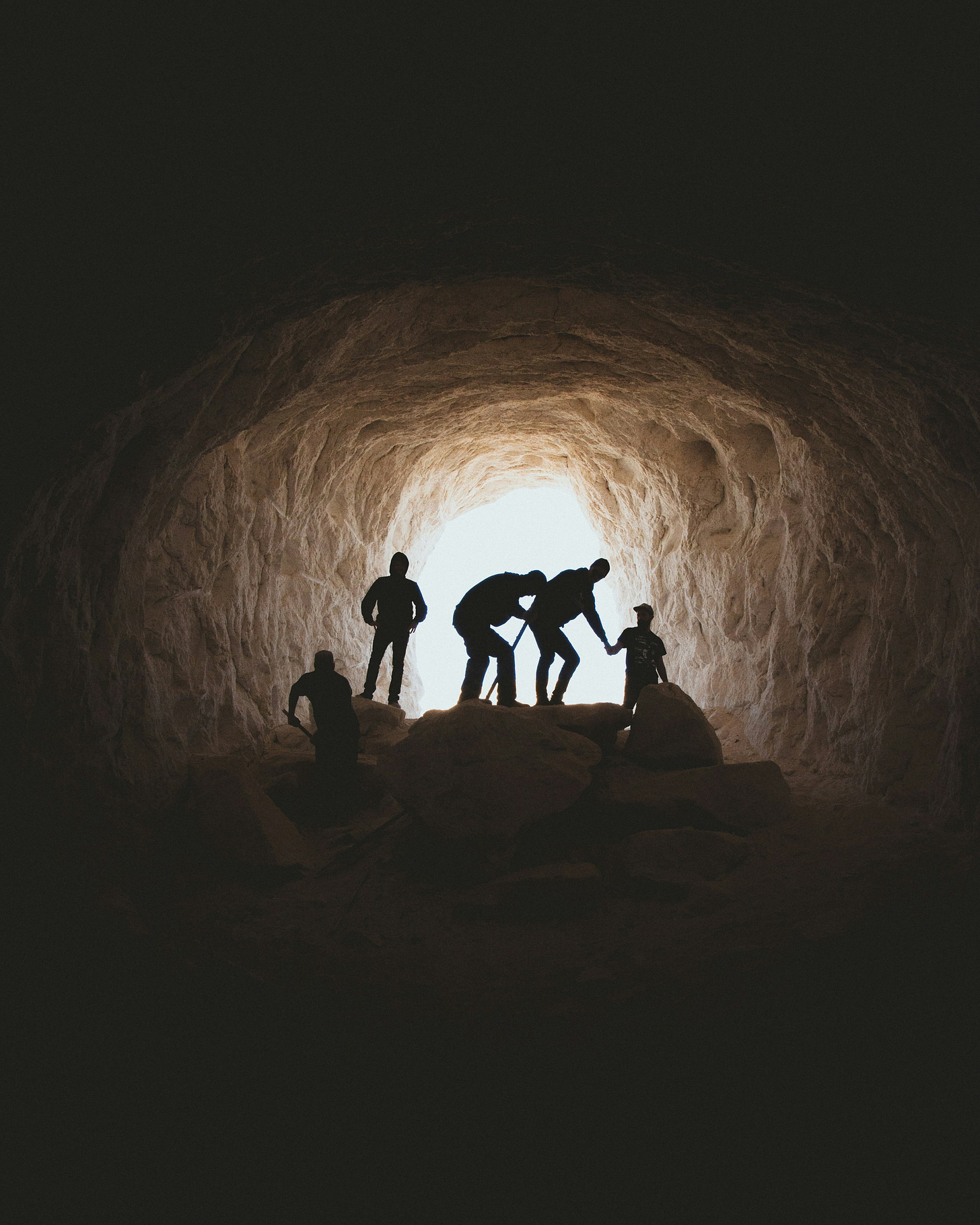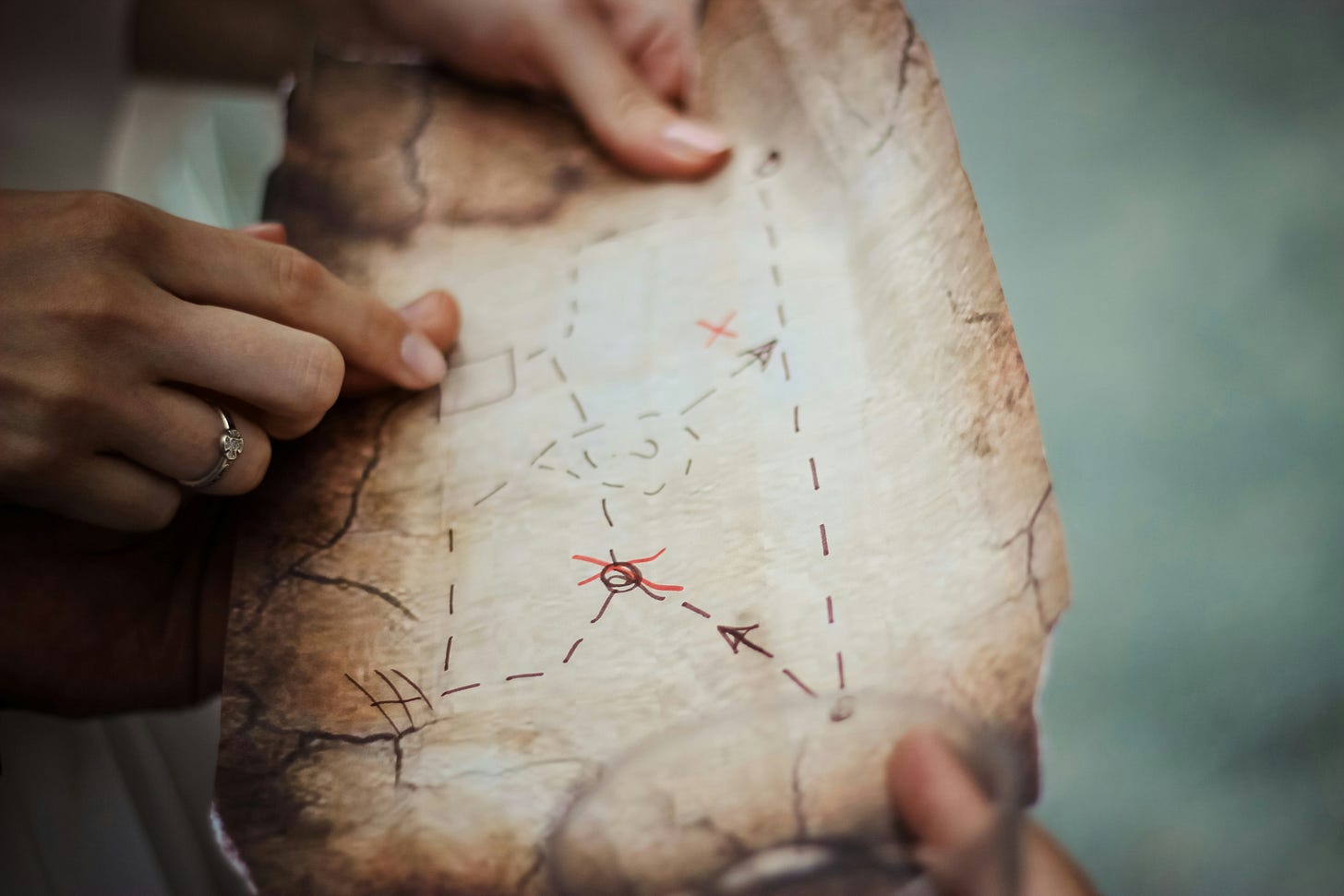🏷️ Categories: Writing, Continuous improvement, Goals
In the 19th century, California was filling up with miners from all over the USA.
Miners from all over were leaving their entire lives behind, grabbing what they could carry and setting off on a long journey to the land that promised fortune. It was the gold rush and news of those who had already succeeded spread like wildfire (LearnCalifornia, 2011). Everyone felt compelled to go there, no one wanted to miss out on the opportunity of the century.
If you think about it, it's not so different from what continues to happen in our lives.
Like the miners, you too have a map to find your way around. There are places you know well and you more or less know your destination, but the map also has areas that are unknown to you. What would you do if only good news starts coming to you from those areas? All your hopes, goals and dreams would live in that enigmatic place.
Your dreams and goals are the treasure, you still don't quite know where they are or how to get there, but you feel that they are hidden in the unknown corners of the map and soon you will get there.
That's how many miners grab their pickaxe, torch and head halfway across the world in search of hidden gold.
Things start to go wrong as soon as you leave the area of the map you knew and challenges you didn't expect appear. Already the road doesn't look like you thought it would.
The situation gets even worse when you find something in the mine. What a disgrace! You had imagined mountains of gold and the most you find is a handful of silver nuggets among all the dirt and rocks. It is undoubtedly worth a lot, but it was not what you were looking for when you left home with your pickaxe.
Many miners here say to themselves: "Well, there's no gold here. There's no gold here, I've wasted my time in this mine! I'd better go to that other one, I see a lot of miners picking there".

This miner who has travelled halfway around the world to try his luck forgot one thing when he left home: to check if there was a gold mine under his house.
Literally under their own feet.

When your compass is someone else's compass
More than once I have been like the miner I describe, I'll be honest with you.
When we hear the good news of others, we feel compelled to imitate their steps in order to be as successful (Colman, 2006), but let me tell you something, the miner you admire has already taken the nugget you wanted, it is time to go for another one, and it will probably not even be in the same mine. Each person has unique circumstances and opportunities are changeable; to imitate in this way is to fall into survivor bias (Wald, 1980).
Instead of imitating that miner, ask him why he mines there and what equipment he uses.
The key is not to imitate him, but to gather information so that you can make good decisions.
It is not in your interest to poke someone else's mine, it is in your interest to learn how to find your own gold mine.
Your own gold mine
Surely you have goals in mind, but maybe you have doubts about how to achieve them. In that case we still need to find a way to get to the gold mine, try this:
1. Don't confuse habits with goals:
Habits are the direction towards your goals, goals are punctual milestones along the way. Your habits define your lifestyle, who you are and who you are going to be.
It is one thing to be a pianist, it is another to prepare to play a particular piece.
It's one thing to be a writer, it's quite another to write your first book.
2. Focus on a few goals, forget the rest:
The more goals, the more you have to divide your time and energies.
Focus on a few if you want to make significant progress. A friend of mine recently suggested I do a podcast. I told him I would love to, but I couldn't because I now had other goals and a lot of habits to maintain.
If I had accepted his proposal my writing habit would weaken and my performance as a writer would drop drastically. It's a matter of prioritising.
See what I mean?
3. Be prepared for imperfection:
Remember what I used to say about asking other miners?
Ask your peers, research how you can achieve your goal and think about what habits you need to create to get you there. Learn enough to be able to start taking your steps with determination, but don't get obsessed with being 100% prepared, you will never be prepared enough to start an unknown journey.
If I had waited until I was perfectly prepared to write, I'd still be thinking about the name of my Substack...
There are things you will learn along the way, don't delay your start too long.
4. Make it sustainable:
The most brutal example I know of is January.
Many people set themselves New Year's goals and start with a motivation that is frightening. By February they have given up. The reason is clear, they had set exaggerated goals and wanted to go at a pace that takes a long time to achieve; they end up running out of energy and give up in frustration. They wanted immediate results.
Know yourself and find your ideal pace to give quality results without tiring yourself out.
5. Patience:
The more ambitious your goals, the longer you will have to stick to your habits.
When you tell someone that you have set personal goals years in the future they will make funny faces, but, like miners, to get what you are looking for you will have to sift through many kilos of dirt and rocks just to find a tiny but valuable nugget of gold in the middle of it all.
I am currently sifting.
I've been writing for 6 months now and I just accomplished my first goal; to see if I was able to write for 6 months in a row. In other words, I wanted to see if I could sift through kilos of dirt every day for half a year. I didn't even worry about striking gold, I just wanted to make a habit of it. There is still a long way to go before I write the best works.
It's a matter of continuing to sift through the earth and going deeper and deeper into my own mine.

We are used to immediacy, but goals require patience.
✍️ Your turn: Have you ever let what other people do decide your course?
💭 Quote of the day: "Have patience with all that remains unresolved in your heart". Rainer Maria Rilke, Letters to a Young Poet.
Thanks for joining me for another day, take care 😊.
References 📚
Colman, A. M. (2006). “Bandwagon effect”. A Dictionary of Psychology. Oxford University Press, USA.
LearnCalifornia. (2011, julio). California Gold Rush. https://web.archive.org/web/20110727033216/http://www.learncalifornia.org/doc.asp?id=118
Wald Abraham. (1980, 1 julio). A Reprint of A Method of Estimating Plane Vulnerability Based on Damage of Survivors. https://web.archive.org/web/20190713234909/https://apps.dtic.mil/docs/citations/ADA091073







thanks, alvaro! excellent.
Great article, Alvaro. Making habits starts the process toward success and achieving even those habits is a triumph. I got a kick out of your perfection comments. I had a conversation with a woman whose grown children were learning Spanish so they could travel. She disparaged her son who traveled before learning to speak Spanish perfectly and fluently. He just learned some basic skills and took off. Her daughter didn't want to speak until she knew the language perfectly. The mother was very proud of her for that reason. I said, "Well, your son will never starve while traveling or sleep in the rain, while your daughter will never be able to get out the front door."